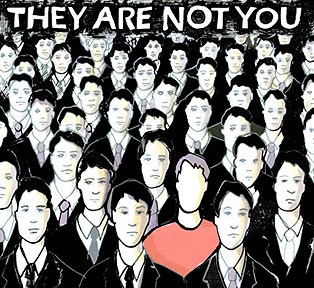
How did the Awkward Party Comment shift from “I know, I read your Livejournal” to “You read what I posted on Facebook, right?” As I explained last week, this change is related to what I call the devolution of friendship. In devolved friendship, we expect our friends to take on a greater share of the friendship-labor involved in being friends with us. I link the devolution of friendship to the affordances of social media sites, and particularly to general broadcasting and frictionless sharing. While I don’t go so far as to say devolved friendship is necessarily a bad thing (or a good thing), at least two of its characteristics deserve a closer examination: the non-uniform rationalization of friendship-labor and the depersonalization of friendship-labor. I explore both below.
The Non-Uniform Rationalization of Friendship-Labor
Social media has rationalized “sharing with friends” to the point of relentless efficiency, but it has not rationalized “being shared with” to the same degree. Instead, the ease of sharing means that we are now bombarded with ‘shared’ information—something Facebook itself has acknowledged with its new “sponsored” status updates, and that some of us acknowledge when we turn off frictionless sharing because we’re concerned about “spamming” our friends. We produce “sharing” at a rate far greater than we can consume it, and we flood the marketplace for attention.
![]() In short, “sharing” has become a lot easier and a lot more efficient, but “being shared with” has become much more time-consuming, demanding, and inefficient (especially if we don’t ignore most of our friends most of the time). Given this, expecting our friends to keep up with our social media content isn’t expecting them to meet us halfway; it’s asking them to take on the lion’s share of staying in touch with us. Our jobs (in this role) have gotten easier; our friends’ jobs have gotten harder.
In short, “sharing” has become a lot easier and a lot more efficient, but “being shared with” has become much more time-consuming, demanding, and inefficient (especially if we don’t ignore most of our friends most of the time). Given this, expecting our friends to keep up with our social media content isn’t expecting them to meet us halfway; it’s asking them to take on the lion’s share of staying in touch with us. Our jobs (in this role) have gotten easier; our friends’ jobs have gotten harder.
Of course, some of our friends might not mind performing more friendship-labor. Their own friends:time ratios might be low, and therefore allow them to keep up with everything we produce and circulate. Other friends might decline to perform the extra friendship-labor we implicitly demand of them, but also not mind maintaining closeness across a more distanced engagement. Still other friends might be ok with the fact that, again and again, we still haven’t seen whatever super-awesome thing of unbelievable awesomeness they posted, even though they posted it on whatever platform a week ago. Regardless, the shift from a “push” model of friendship to a “pull” model is worth noting.
It’s important to note here that, though I talk about our roles as share-producers and as share-consumers, these roles are deeply interrelated. This is because social media is something we prosume, something we both produce and consume in a simultaneous bi-directional feedback loop not unlike the give-and-take of functional friendship. The shares we produce often contain the same content we consumed just moments earlier; even when we generate original content, chances are pretty good we’ll consume some of our friends’ shares while logged in to social media sites to produce our own shares. If any frictionless sharing functions are in play, our content consumption fuels a whole stream of newly-produced share content. Even if we’ve turned off frictionless sharing, and even if we don’t repost anything we consume, our content consumption still produces data through cookies and other online tracking devices, and this data in turn feeds back into the algorithms that shape and structure our social media experiences. Though how much deliberate effort we put into each role may vary, the reality of prosumption is that it’s essentially impossible to engage in either the production or the consumption of social media content without engaging in the other. (Make a mental note of this concept if you don’t already know it, because I’ll reference it again near the end.)

The Depersonalization of Friendship-Labor
The second thing worth noting is that devolved friendship is also depersonalized friendship. Sure, we still send specific messages to specific friends through social media services, through other electronic media like email and text messages, and through non-electronic media; the personalized, hard-to-track shares that take place through email and text message communication (etc) may get called “dark social,” but they’re still social and we’re still engaged in producing them. We also still post things on each other’s individual Facebook walls, and we still send @replies on Twitter. Sometimes we share with specific friends within our generalized broadcasts, perhaps by tagging them in a Facebook status update or by slipping an @mention into the middle of a tweet. These things are not examples of depersonalized friendship. Frictionless sharing and generalized broadcasting, however, do represent depersonalized friendship, because we’re not sharing with any one or more of our friends in particular. Instead we’re sharing generally, with an unknown subset of people who will self-select from whatever potential audience we’ve allowed.
I talked a bit about this difference between “social” and “personal” sharing last week in an expanded version of my August post about the social music streaming service Spotify. To summarize, I signed up for a free trial of Spotify in order to update my essay, and found that being on Spotify isn’t at all what I’d expected. Given that Spotify is supposed to be “social,” and that near a half dozen people had been pushing me for weeks to start using it, I sort of expected that…you know…being on Spotify would involve experiences that felt like socializing. I imagined Spotify would be like a geographically distributed, digitally-enabled version of the old H3W porch (that’s Historic 3 Wadsworth), where a certain group of my friends used to spend every Monday night listening to—and arguing about—music. Friends, conversations, shared songs, chaotic banter: personal, collective, reciprocal social interaction.
Being on Spotify, however, is not like being on the porch. When you show up on the porch, your friends talk to you. Though a good deal of conversation (and performance) is addressed to the generalized audience of the group, your friends speak to you individually as well[i]. There will also be times when you, specifically, are called upon to address the group, even before Monday becomes Tuesday and the world’s most wonderfully esoteric word game begins. Even when you are not speaking your friends recognize that you are there, and you recognize that you are there. Everyone on the porch knows that everyone on the porch knows who’s on the porch. The group may be a generalized audience, but it is a specific and mutually recognized generalized audience.

When you show up on Spotify, however, your friends don’t automatically talk to you. They don’t automatically send you notes and songs either, the way I do with my friends via both email and snailmail. You can see when your friends are listening to something (if they scrobble, or have “Spotify Social” enabled), but you have no idea if any of them know you’re there and looking. Scrobbling might be “social,” but it’s not very personal by default.
Personal interaction doesn’t just happen on Spotify, and since I was hoping Spotify would be the New Porch, I initially found Spotify to be somewhat lonely-making. It’s the mutual awareness of presence that gives companionate silence its warmth, whether in person or across distance. The silence within Spotify’s many sounds, on the other hand, felt more like being on the outside looking in. This isn’t to say that Spotify can’t be social in a more personal way; once I started sending tracks to my friends, a few of them started sending tracks in return. But it took a lot more work to get to that point, which gets back to the devolution of friendship (as I explain below).
When I first started poking around on Spotify, I wasn’t at all sure what the behavioral and interactional norms were supposed to be. Clicking on my friends’ listening activity without talking to them felt a bit like rifling through somebody’s CD collection without permission after they’d stepped out to use the restroom—which I recognize some people don’t mind, but which to me feels like something of a transgression. One ‘Spotivangelist’ friend told me that I was being ridiculous, and that scrobbling (frictionless sharing of one’s listening activity) is “donating your taste to a generalized other.” I wasn’t sure I agreed exactly, but I took that one friend’s statement as tacit, blanket permission to start checking out what any of my friends were listening to (without clicking into “private” mode beforehand, and then feeling guilty about it later).

I’ve been thinking since, however, on what it means to view our friends as “generalized others.” I may now feel like less of like “creepy stalker” when I click on a song in someone’s Spotify feed, but I don’t exactly feel ‘shared with’ either. Far as I know, I’ve never been SpotiVaguebooked (or SubSpotified?); I have no reason to think anyone is speaking to me personally as they listen to music, or as they choose not to disable scrobbling (if they make that choice consciously at all). I may have been granted the opportunity to view something, but it doesn’t follow that what I’m viewing has anything to do with me unless I choose to make it about me. Devolved friendship means it’s not up to us to interact with our friends personally; instead it’s now up to our friends to make our generalized broadcasts personal.
Nathan Jurgenson (@nathanjurgenson) has suggested that my awkward feelings about interacting with individual friends as a ‘generalized other’ are a form of cyberasociality [pdf], but I’m not certain I agree with him. I think the key piece in my discomfort, in my inability to read frictionless sharing and generalized broadcasts as friendship-labor (or as “personal social interaction”) in and of themselves, is that these forms lack clear mutual acknowledgement. The problem is that they’re depersonalized, not that they’re digitally mediated. That said, for all the examples of interaction that is both digitally mediated & mutually acknowledged that I can list, I can’t come up with an analogous non-digital form of depersonalized friendship-labor. If depersonalized friendship-labor is in fact unique to digitally mediated interaction, I can’t dismiss ‘resistance to depersonalized friendship as cyberasociality’ as readily as I would like.
In any case, regardless of whether it brings more harms or benefits—and regardless of my (potentially cyberasocial) relationship to it—devolved friendship’s attendant depersonalization deserves attention. When we consider the lopsided rationalization of ‘sharing’ and ‘shared with,’ as well as the depersonalization of frictionless sharing and generalized broadcasting, what becomes clear is this: the social media deck is stacked in such a way as to make being ‘a self’ easier and more rewarding than being ‘a friend.’

Jenny Davis (@Jup83) recently highlighted the incentivization to share with her concept of FOBM, or “fear of being missed.” FOMO, “fear of missing out,” is the anxiety we feel when we can’t keep up with consuming all the share-content our friends produce. Because it is now up to us to turn our friends’ generalized broadcasts into personal interaction, we can never know how many opportunities for connection slip by and are lost when we get behind in sifting through our streams. But again, that sifting takes a lot of work: as Davis says of her experience watching the second Presidential debate without access to Facebook or Twitter, “I wanted to see what everyone was saying, but I also knew that the vast majority of [even the smartest members of my network] would not be saying much of substance.” Davis’s comment is not a snarky remark about her friends, but rather an acknowledgement of the fact that even if she’d had access to Twitter during the debate, she’d have been sorting through a lot of dumb “binders full of women” jokes to get to more substantive conversations about, say, sexism in the workplace.
Fear Of Being Missed, on the other hand, is the anxiety we feel when we can’t produce share-content ourselves. As Davis explains in the comments, FOBM “isn’t that others recognize and lament one’s absence, but rather, that one is skipped over or unseen.” If FOMO is the fear of being excluded and forgotten for failing to consume share-content, FOBM is the fear of being excluded and forgotten for failing to produce share-content. “Interaction begets interaction,” Davis explains. So assuming we want interaction with our friends, how do we go about getting it? On the one hand we can attempt to tackle FOMO, and knock ourselves out sorting through all of our friends’ share-content looking for individual instances of generalized friendship-labor that we can work to personalize. On the other hand, we can attempt to tackle FOBM–and skip the sorting, in favor of letting our friends respond to our own generalized friendship-labor. Obviously the vast majority of us take on both of these tasks, but the latter is a much more efficient way to harvest the attention and acknowledgment we crave.
It’s easy to share, to broadcast, to put our selves and our tastes and our identity performances out into the world for others to consume; what feedback and friendship we get in return comes in response to comparatively little effort and investment from us. It takes a lot more work, however, to do the consumption, to sift through everything all (or even just some) of our friends produce, to do the work of connecting to our friends’ generalized broadcasts so that we can convert their depersonalized shares into meaningful friendship-labor.

We may be prosumers of social media, but the reward structures of social media sites encourage us to place greater emphasis on our roles as share-producers—even though many of us probably spend more time consuming shared content than producing it. There’s a reason for this, of course; the content we produce (for free) is what fuels every last ‘Web 2.0’ machine, and its attendant self-centered sociality is the linchpin of the peculiarly Silicon Valley concept of “Social” (something Nathan Jurgenson and I will discuss together in greater detail next week). It’s not super-rewarding to be one of ten people who “like” your friend’s shared link, but it can feel rewarding to get 10 “likes” on something you’ve shared—even if you have hundreds or thousands of ‘friends.’ Sharing is easy; dealing with all that shared content is hard.
Obviously there’s a whole lot more to friendship than sharing links, songs, and moving pictures (even if they’re pictures of spinning disco chickens, or of an epic sports catastrophe). But I wonder sometimes if the shifts in expectation that accompany devolved friendship don’t migrate across platforms and contexts in ways we don’t always see or acknowledge. Social media affects how we see the world—and how we feel about being seen in the world—even when we’re not engaged directly with social media websites. It’s not a stretch, then, to imagine that the affordances of social media platforms might also affect how we see friendship and our obligations as friends most generally.
Whitney Erin Boesel does the majority of her generalized broadcasting—and a good deal of specific broadcasting, too—on Twitter: @phenatypical
Friend collage image from http://www.nytimes.com/2010/05/30/fashion/30FACEBOOK.html?pagewanted=all
Enough friends image from http://avatar.hq-picture.com/too-many-friends-avatar-36446.html
They are not you image from http://emiliesicons4friends.xanga.com/
Crowd at train station photo from http://lynan.wordpress.com/2012/07/14/what-does-it-feel-like-to-be-lonely/
Blurred people image from http://carlcj.tripod.com/GalleryII/
Boy lost in crowd image from http://www.richwainwright.com/blog/foreign-assignments/borders-barriers-israeli-separation-barrier/attachment/israel0023/
Still from Tideland from http://pj-shadow.blogspot.com/2010_12_01_archive.html
[i] If you’re shy, or an introvert, or both: this actually matters.

Comments 9
Barry Wellman — October 24, 2012
Whitney,
Thanks for your smart and thoughtful essay.
I think we may be approaching FOMOASM: Fear of Missing Out on Another Social Media.
My attempt at a meme today.
Louise — October 25, 2012
Great piece - I love your formulation about the social-media cards being stacked in favour of being a self not a friend. Spot on. It feels like another of those examples where social media exacerbates and highlights off-line relationship structures in a way though - I read a funny blog post recently about how it's so much more gratifying to recommend a book to someone (makes you feel clever and knowledgeable) than it is to have one recommended (creates feelings of obligation - and 'oh no, something else to read').
Your essay makes me wonder what might be the rewards of being the 'friend' - is it just obligation/friendship-maintenance (would that be enough of a motivation to do all that work?) or is there something more? For example where hierarchies are in place, 'liking' the shares of a person with higher social value and status allows you to associate yourself with that.
Boaz — October 25, 2012
It seems that in some there are two kinds of relationships at stake in some of these social network type environments. There are the relationships we have to each individual person, and the then the relationship to a kind of generalized group. In my experience, the general sharing produces an improved sense of one’s relationship to the generalized group while it changes the relationships we have with the individuals. If I have someone close to me in the group and I share something important and personal and they don’t respond, there is a sense of diminution of my relationship with that person. At the same time there is a sense of strengthening of some of the other relationships. A kind of evening out of relationships. The “cyberasociality” you refer to could be the resistance to this way in which your relationships can change. I have some very valuable friends, and maybe in some sense I’m relatively satisfied with this, so why should I engage with the group in a way that may diminish these relationships? Yes, one gets something back from the general experience, but there is loss at the same time. I think the “you read what I posted on Facebook, right?” is somehow an attempt to repair the damage that may have been done to a relationship due to generalized sharing.
It would be interesting to relate the relationships one has to this generalized other in social media environments to other types of groups, such as religious groups, or political groups. Here we have a “social media platform group”- those people who use Facebook, for example. I couldn’t help feeling that with Facebook there is at least some connection to cultish religious movements where one is expected to sacrifice one’s individual relationships to a generalized other represented by the group. Maybe an analysis of group dynamics in cults of varying degrees of isolation could give insight into where the group dynamics can be enriching, and where it can be exploitative.
48. READ. LOOK. THINK. | JESSICA STANLEY. — October 25, 2012
[...] Expecting our friends to keep up with our social media content isn’t expecting them to meet us halfway; it’s asking them to take on the lion’s share of [...]
In Their Words » Cyborgology — October 28, 2012
[...] “Scrobbling might be “social,” but it’s not very personal” [...]
Social Media and the Devolution of Friendship: Part II » Cyborgology | galavant media | an @s_m_i production — October 31, 2012
[...] Social Media and the Devolution of Friendship: Part II » Cyborgology [...]
“social” versus “Social” » Cyborgology — November 1, 2012
[...] more comfortable and familiar. It is easier to swallow massive changes to interpersonal norms, expectations, and behaviors when such shifts are repackaged and presented as the delightful idea of being “social” with [...]
Social Media and the Devolution of Friendship: Full Essay (Pts I & II) » Cyborgology — December 18, 2012
[...] (This is the full version of a two-part essay that I posted in October of this year. Here are links to Part I and Part II) [...]
Whitney Erin Boesel on self-centered sociality and who it serves « Greg Mathes — December 31, 2012
[...] thesocietypages.org/cyborgology/2012/10/24/social-media-and-the-devolution-of-friendship-part-ii/ [...]